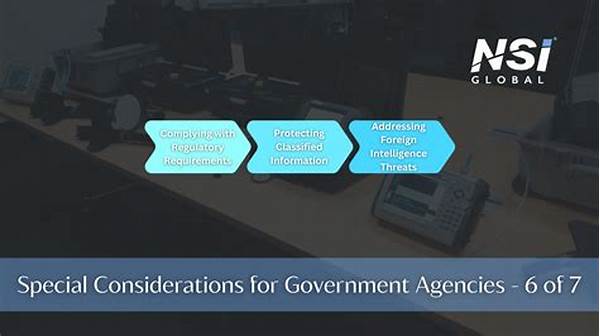In recent years, the realm of international relations has increasingly been defined by the need for nations to collaborate on matters of security, particularly in the sphere of counter-intelligence. As global threats become more sophisticated and interconnected, the necessity for a unified international counter-intelligence effort has become more pronounced. This article delves into the intricacies of such a collaborative approach, examining its components, objectives, and the challenges faced in implementing effective strategies. Through a combination of shared intelligence, technological innovations, and diplomatic cooperation, nations aim to enhance their collective security and counteract threats to global stability.
The Importance of Collaboration in Intelligence
Unified international counter-intelligence efforts are crucial in addressing the dynamic and evolving threats that transcend national borders. By fostering collaboration, nations can pool their resources, share intelligence, and leverage each other’s strengths to combat espionage, cyber threats, and other forms of covert activities that pose risks to national and global security. Such collaborations enable countries to act swiftly and decisively against potential threats, utilizing comprehensive strategies that single nations may be unable to achieve independently. Furthermore, these efforts are bolstered by alliances that prioritize transparency, trust, and coordination to safeguard sensitive information and maintain a robust security posture.
Moreover, unified international counter-intelligence efforts contribute to the establishment of standardized protocols and practices that facilitate seamless information-sharing and joint operations. This standardization not only streamlines intelligence processes but also minimizes misunderstandings and errors that could arise from disparate methods. Additionally, collaborative endeavors often involve capacity-building initiatives that enhance the intelligence capabilities of partner nations, thereby creating a more resilient global defense network. Ultimately, by engaging in unified international counter-intelligence efforts, the international community is better equipped to anticipate, identify, and neutralize threats before they escalate, ensuring the safety and security of nations and their citizens worldwide.
Technological Advancements and Intelligence
Technological advancements play a critical role in unified international counter-intelligence efforts by enhancing the capabilities of nations to detect and counter threats. The integration of cutting-edge technologies such as artificial intelligence, machine learning, and advanced analytics facilitates real-time monitoring and analysis of vast amounts of data. Such innovations enable intelligence agencies to identify patterns and anomalies indicative of potential threats. Additionally, unified international counter-intelligence efforts rely on secure communication channels and encryption technologies to maintain the integrity and confidentiality of shared intelligence. These technological tools fortify the collaborative framework, ensuring that participating nations can effectively counteract espionage activities and safeguard national security.
Challenges in Implementing Collaborative Strategies
Despite the clear benefits, unified international counter-intelligence efforts face several challenges in their implementation. One significant obstacle is the varying levels of trust and transparency among participating nations. Divergent interests and historical tensions can hinder effective collaboration, as countries may be reluctant to fully share sensitive information. Furthermore, differences in legal frameworks, intelligence methodologies, and strategic priorities pose additional barriers to seamless cooperation. To overcome these challenges, nations must invest in building trust through diplomatic engagement and establish clear guidelines that govern intelligence-sharing and joint operations. Strengthening these cooperative mechanisms is critical for the success of unified international counter-intelligence efforts in addressing emerging global threats.
Key Aspects of Collaborative Intelligence
1. Information sharing is a cornerstone of unified international counter-intelligence efforts, enabling nations to pool resources and collectively address security threats.
2. Joint training exercises foster interoperability among intelligence agencies, enhancing the effectiveness of multinational operations.
3. Legal frameworks governing intelligence collaboration ensure accountability and adherence to international laws, strengthening unified international counter-intelligence efforts.
4. Diplomatic channels facilitate dialogue and negotiations, addressing political and historical challenges to cooperation.
5. Technological integration enhances data analysis capabilities, supporting the rapid identification of emerging threats.
Building Trust in International Intelligence
Building trust among nations is a fundamental component of successful unified international counter-intelligence efforts. Trust is cultivated through open diplomatic channels, regular communication, and the establishment of mutual objectives that prioritize collective security. Transparency in intelligence-sharing practices and adherence to agreed-upon legal and ethical standards further reinforce trust among participating countries. Additionally, trust is bolstered by the demonstration of positive outcomes from collaborative efforts, such as the successful neutralization of threats and the protection of national interests. By fostering an environment of trust, nations can effectively coordinate their actions, optimize resource utilization, and achieve shared security goals.
In conclusion, the efficacy of unified international counter-intelligence efforts hinges on the ability of nations to overcome inherent challenges and build enduring trust-based partnerships. By doing so, the global community can enhance its resilience against sophisticated threats through comprehensive, coordinated, and well-resourced intelligence operations.
Strategies for Enhancing Intelligence Collaboration
Developing effective strategies for unified international counter-intelligence efforts requires a multifaceted approach that addresses both political and operational aspects of collaboration. One such strategy involves establishing comprehensive legal frameworks that facilitate secure information-sharing and protect the rights of all parties involved. Additionally, creating standardized protocols for communication and data exchange ensures consistency and efficiency in joint operations. Training programs that focus on cultural sensitivity and the specific challenges faced by partner nations can also enhance mutual understanding and cooperation. Finally, leveraging technology to improve data analysis and threat detection further strengthens the global counter-intelligence infrastructure, bolstering overall security efforts.
Summary of Collaborative Counter-Intelligence Efforts
Unified international counter-intelligence efforts represent a significant advancement in the global security landscape, aiming to address complex threats through coordinated action and shared resources. These collaborative endeavors are essential in detecting, analyzing, and neutralizing risks that no single nation can effectively confront alone. By leveraging collective intelligence capabilities, nations can enhance the accuracy and timeliness of threat assessments, ensuring that preventative measures are both strategic and comprehensive. The success of these efforts relies on robust diplomatic relations and the establishment of trusted partnerships, which form the foundation for effective intelligence collaboration.
Furthermore, unified international counter-intelligence efforts are characterized by the dynamic integration of technology and innovation, which play pivotal roles in countering modern threats. Advanced tools and techniques for data analysis, secure communication, and threat detection enable intelligence agencies to act swiftly and decisively. However, the realization of these collaborative efforts is not without challenges. Issues such as trust, legal compatibility, and operational discrepancies must be addressed to achieve an optimal intelligence-sharing environment. Through sustained diplomatic engagement, technological advancement, and adherence to established protocols, the international community can fortify its defenses against an array of global security threats.





